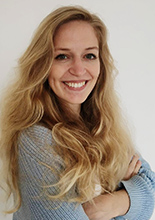DA alumna Maresi Engelmayer on her career since graduating from ETIA 11 in 2019
 You work for the Austrian public broadcaster ORF’s “Religions- und Ethikabteilung” (Department of Religion and Ethics) as a journalist. What exactly are your responsibilities on the job and how did your career path look like so far?
You work for the Austrian public broadcaster ORF’s “Religions- und Ethikabteilung” (Department of Religion and Ethics) as a journalist. What exactly are your responsibilities on the job and how did your career path look like so far?
I started working as a data journalism intern at “Zeit im Bild 2” during the last month of university. It was two weeks after the Ibiza scandal hit Austria. Being around some of the most brilliant journalists in our country, I already felt extremely lucky. Only a few months later I was working with them even closer - day and night. As the pandemic hit, the ORF management decided that crucial workers should go into isolation and live at the ORF's headquarters at Küniglberg. What was planned to be a two-week stay turned out to be almost a month working and living at the office. It was yet again an intense time, especially for the data team at the "Zeit im Bild": Gathering data on the coronavirus, checking sources, translating diffuse and complex data into accessible information and finding interesting details to present on the show.
Since February 2021, I additionally started working as a freelance journalist at the Department for Religion and Ethics. Given the substantial sensitivity of both religion and ethics, I find myself in challenging situations on a daily basis. I mostly cover news in that area, producing TV and radio stories for “Zeit im Bild” and the Austrian national radio channel Ö1. I could not even describe a normal day in my job, as every day is different. However, mostly it’s checking what is happening in the world, speaking to lots of different people and creatively putting all the gathered information together.
Have you always been interested in journalism or has this interest developed over time?
Even before my studies at the DA I did internships in journalism. During my time at the DA I worked at an embassy and at the UN. Nonetheless, I discovered that I like international politics, but from a different perspective: I like to analyse it, report about it, talk about the implications, rather than being part of the negotiations.
How has the DA helped you develop your career?
The interdisciplinarity of the studies rendered me able to jump into almost every story and have at least a solid fundament of knowledge on the topics. In my job I have to work extremely fast and often under a lot of pressure. Having a knowledge base helps a lot.
But mostly I enjoy that we learned that everything is connected. I learned that legal frameworks have to be looked at through historical and political lenses and that the slightest political actions have economical and other multifaceted implications. This helps me not to go into too much detail and focus on making my stories easy to understand, even if the content seems complicated.
Is there a specific skill set taught at the DA that is particularly useful for your current job?
What I needed most in my job so far is the ability to speak to people with diverse backgrounds and different types of knowledge - regardsless if it’s a migrant in Bosnia trying to get past the EU border or the local bishop speaking about synodal processes. At the DA, I enjoyed being in a multi-cultural environment, not only speaking foreign languages, but also getting to know new perspectives or simply nurturing cultural exchanges.
Where do you think will the future take you?
I am very happy where I am and I would like to just continue what I am doing: meeting interesting people, learning about a wide range of different topics and trying my best to deliver good stories.
[September 2021]